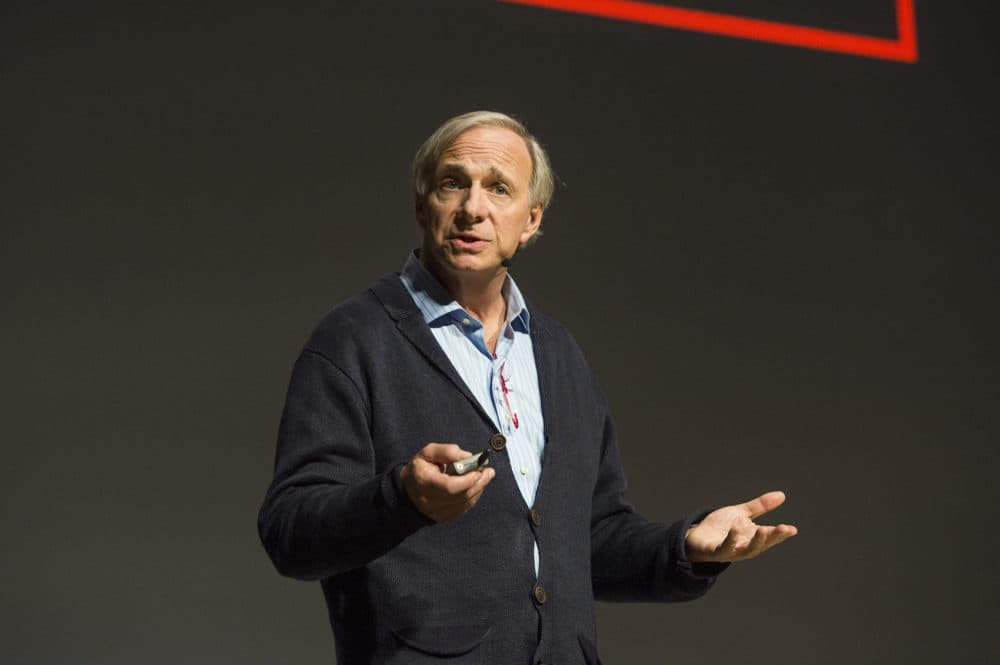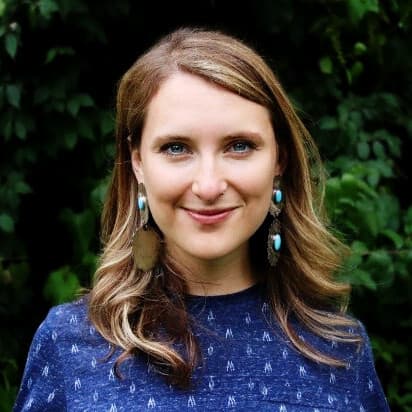Advertisement
Ray Dalio On Capitalism, Inequality: The Outcomes Are Not What We Would Want

Ray Dalio is the founder of the world’s biggest hedge fund. Bridgewater Associates has $160 billion in assets. Last year, its largest fund rose 14%, even as hedge funds broadly lost an average of 6%. Dalio himself has a net worth north of $18 billion dollars.
In short — he understands the flow of capital, of capitalism, very well.
Recently, Dalio joined the growing ranks of billionaires who are lamenting what unfettered capitalism has wrought on America:
"Over these many years I have also seen capitalism evolve in a way that it is not working well for the majority of Americans," he writes, "because it’s producing self-reinforcing spirals up for the haves and down for the have-nots. ... Everything must evolve or die. This is now true for capitalism."
Dalio has ideas on how to fix the system. He shared them, Thursday, On Point.
Highlights From The Conversation
On how and why his thinking on U.S. capitalism has shifted
"I think you have to understand the mentality of the time when I was growing up and it was evolving. Because there was this aspirational aspect of equal opportunity, and idealism, and so on. And so always it's — you could eliminate poverty. You can go to the moon, Kennedy, the aspiration of going to the moon, eliminating poverty and all of that notion of equal opportunity was something that I was very much attached to and have always been. I've been weaned on that.
"Then, as I watch, naturally I study what's going on in all economies and all economies working. If I didn't understand what makes an economy work well, from a global perspective, I would lose money and the game that I'm playing. So I did a lot of understanding — timeless and universal rules of what makes countries successful. There must be this notion that the system is fair and it works for the majority of people. Over a period of time, I watched the statistics change. And then about, I would say, maybe five years ago, that became a concern. And then when we had the election, it tapped into a population that made very clear to me that the averages were not capturing it. ... I thought, 'We're now in a situation where I needed to convey that picture, because it's clear that the outcomes are not the outcomes we would want.'
Advertisement
"I have dealt with almost all leaders, policymakers who run most countries' economic policies over a number of years about what works and what doesn't work, and the reason we have exchanges is because they value those exchanges."
"We, together, in a skillful way have to re-engineer the system in a way that is going to both increase the size of the pie and divide it well, so that most Americans believe that it is fair, and it also produces a better economic outcome."
Ray Dalio
On how we approach the issue of severe inequality
"I think the most important thing is that we all calmly and analytically look at what the situation is, understand the engineering of, why does the economic machine, working this way, to produce what outcomes. I think step No. 1 is, can we agree that the output is not consistent with the goals? That's my first objective. And I think that it's great that you and I and other people can get on the phone and on your show and talk about such things. But I think that would be a great accomplishment. And I think then the next step is to look at the mechanics, as an engineer would look at the economic system. Not to make it a fight between one group or another group, but to look at it and say mechanistically what is happening."
On engineering capitalism to redistribute wealth
"There's enough resources to go around to be able to engineer this in an effective way so that both the pie grows at the same time as it's divided well. I think that capitalists don't know how to divide the pie very well, generally — and, by and large people pursue their self-interest and that's a reality of social classes and all the economic groups — and that at the same time the socialists, the left, might not know how to make that economic pie grow well. In either case, that they have to work together. We have to work together, of all sides, in a bipartisan way, to recognize that we have a problem and output that is not consistent with what our goals are, and that we, together, in a skillful way have to re-engineer the system in a way that is going to both increase the size of the pie and divide it well, so that most Americans believe that it is fair, and it also produces a better economic outcome. ... I think that now is the right time to do that."
On what steps we should take to overhaul capitalism
"The most important principle that I have about having an impact is that the people who have their hands on the various levers of power to change things have got to consider this an emergency. That this is a crisis situation, and if we don't resolve it well, we are going to have a serious situation. Socially, politically and economically, we can harm each other. So I think the first thing is to make sure that there's leadership at the top — and that doesn't mean just the president of the United States. It could be the leadership at the state level, that could be at any level, but there has to be a belief that we have an issue, that we have to engineer and that that has to be engineered smartly and in a bipartisan way.
"I think my biggest concern is that there will be fighting, antagonism so I think it has to be done in a bipartisan way. I'm not saying this is easy, but I think that the smartest people who are skilled, who represent the various communities and understanding, have to go into an engineering exercise.
"I do think that there are ways of dealing with things such as private-public partnerships. There certainly has to be a redistribution of resources. There's no good excuse for education, or health care — certain basics have to be achieved in resources. And that's going to require a certain amount of money, and how that's done and engineered is really going to be key. Because you can adversely affect capital flows, in a way. In other words, like states, sometimes they change your tax rate. It can be a net problem, because people move out of the state. Or you could be in a situation where, if you change income tax rates, it could change from corporate rates to others. So it has to be done in a skillful way.
"I care about the country. It's been wonderful and I really care about it. So this is something that's important to me."
On the question of taxation, and also specifically the capital gains tax
"The bottom 60 percent of the population is too poor and it's resource starved. And as a result of that, there have to be taxes that work in a way to produce, most importantly, equal opportunity. I think that usefulness and productivity of people are connected. That is an important thing. You can't just give them money, you have to give them the opportunity to be useful and productive because it's better for them, psychologically, it's been shown, and it's also better for the economy, as a whole, because you create productivity in the same way. But all of these pieces are connected, because if you change one thing, it has consequences, and it's a very delicate exercise in order to do that.
"No, I wouldn't be objected to capital gains rates, if it was done in a balanced way that serves the purpose of raising the effectiveness. I want to both increase the size of the pie and then divide the pie well."
On whether his calls for overhaul are being heard in the political arena
"I do see a lot of partisanship that is existing in 'the halls of power.' In other words, those in politics. And I think it's important. That's the thing that concerns me — yes, it's a topic, there's a discussion pertaining, but there still remains a desire to largely politicize this thing, and I'm concerned about that element of it. I won't be politicized. I won't participate in that way. I want it to be analytical."
"It's not in my interest to speak out about this. It becomes a high-profile thing. It's a net negative for me, personally, to speak out about this. I feel deeply attached to this issue."
Ray Dalio
On the question of social good from hedge funds
"Most of the money that we manage is for pension funds, endowments and foundations. And we're an asset management firm, not just a hedge fund firm. And as a result of doing that, if you were to ask the pensioners and you were to ask our clients who are teachers or firemen, whether we've contributed to their wellbeing, they would say that they we contribute. They are knowledgeable about how investment managers operate. I think it's almost like saying bankers — you could say that bankers are a problem. Well, there are good bankers and there are bad bankers, and just like there are good car dealers and there are bad car dealers, or there are good doctors and bad doctors. And I think that to make a generalization about how a particular industry is operating is not a good thing. No, I don't like that sweeping generalization.
"When I decided whether I would speak out at this — it's not in my interest to speak out about this. It becomes a high-profile thing. It's a net negative for me, personally, to speak out about this. I feel deeply attached to this issue and I feel that a lot of people who are in my position don't speak out about these issues because they want to take a low profile. And I felt that difficult to do so."
Alex Schroeder adapted this interview for the web.

